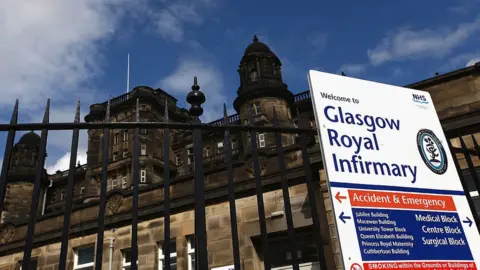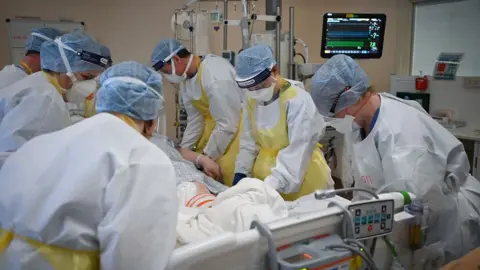NHS Greater Glasgow & Clyde pauses non-urgent operations
 Getty Images
Getty ImagesScotland's largest health board has become the latest to confirm it is pausing non-urgent elective operations.
NHS Greater Glasgow & Clyde said the move was aimed at prioritising urgent treatment and cancer care.
Ayrshire & Arran and Borders have taken similar steps due to pressures in hospitals. NHS Fife has said it is reducing its elective surgery capacity.
It comes days after the first minister said this was the worst winter that the NHS in Scotland had ever faced.
Greater Glasgow & Clyde said staff were doing all they could to meet demand and it had not taken its decision lightly.
"Our services, like the whole of NHS Scotland, are facing major pressures, including significant COVID, flu and norovirus cases," a spokesperson said.
"To support our A&E departments, NHS Greater Glasgow and Clyde has taken the decision to pause additional and non-urgent elective procedures to prioritise urgent treatment and cancer care.
"This decision was not taken lightly and is under constant review.
"We would like to apologise to patients waiting for an elective procedure, we will make every possible effort to offer them an alternative date at the first opportunity."
 Getty Images
Getty ImagesNHS Fife confirmed that while elective capacity was "considerably reduced", it had not paused the entire elective surgical programme amid what the health board said was likely to be the busiest winter on record.
A spokesperson added: "Our staff are working incredibly hard to continue to deliver safe patient care."
NHS Ayrshire & Arran announced on Tuesday that it was halting routine inpatient elective surgery for three weeks, citing "extreme" pressures on the health service.
On Friday, NHS Borders paused all routine operations at Borders General Hospital until further notice.
First Minister Nicola Sturgeon has warned Scotland's hospitals are "almost completely full", with bed occupancy exceeding 95% last week.
She said demand had been driven up by "extraordinary" levels of winter flu, rising rates of Covid infections and cases of Strep A.


At the start of the week the first minister said the government did not want to revert to a national emergency footing for the NHS because, for example, of how things like a blanket cancellation of routine surgery could impact patients.
Instead, she said health boards would take local measures to prioritise critical and life-saving care.
The majority of boards have told us they are working at some kind of emergency level because the pressures are so great. Many are cancelling some, if not all elective surgeries.
Decisions are also being taken for staff to be deployed to wards they would not normally work on and in some areas, GPs are only taking urgent or emergency appointments.
It's not unheard of for health boards to have to suspend at least some routine operations for a short period - particularly at this time of year. In fact we've seen it at many points during the pandemic.
Hospitals also plan for surges of flu or Covid and try to create extra bed capacity during the winter.
However it's highly unusual for hospitals to be almost entirely full for months on end and cancel elective surgeries more regularly.
It may not be called a critical incident or a code black, but many health boards have been operating at that level or at the margins of their capacity for months, with the Christmas and New Year period the worst it has ever been.
The hope is that in the next few weeks admissions for conditions like flu will start to decrease, and that will help get things back on track.
Without a doubt health services are stretched in ways we have never seen before and that will continue to have long term consequences.

During FMQs on Thursday, Ms Sturgeon told MSPs she expected the pause on operations in Glasgow to be "for a very short period".
She said the government continues to do everything possible to support NHS boards facing unprecedented pressures.
"Some of that does necessitate longer term reform in our national health service, but some of that is absolutely being caused by the winter pressures that have been at their peak in recent weeks," she added.
However Scottish Labour leader Anas Sarwar said the crisis was not because of flu, Covid or winter pressures, but was rather "15 years in the making".
Meanwhile Scottish Conservative leader Douglas Ross accused the first minister of "patient blaming language" after she said there were unnecessary attendances at A&E departments.
And Lib Dem leader Alex Cole-Hamilton called the long waits for NHS treatment "appalling".
Health Secretary Humza Yousaf confirmed on Tuesday that the government will allocate £8m in a bid to free up hospital beds by moving patients to care homes.
NHS 24 is aiming to recruit about 200 new staff before the end of March, while guidance has been issued to all health boards making it clear that they can take any necessary steps to protect critical and life-saving care in their areas.
